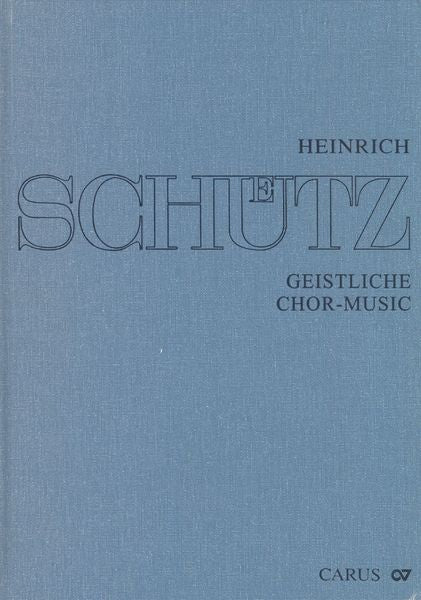Schütz: Geistliche Chor-Music 1648
Stuttgart Schütz Edition Volume 12
In stock and typically ships within 1 business day.
- Composer: Heinrich Schütz (1585-1672)
- Editor: Michael Heinemann
- Format: Full Score
- Binding: Hardcover
- Work Language: German
- ISMN:
- Size: 8.3 x 11.7 inches
- Pages: 344
Description
When it comes to paying tribute to Heinrich Schütz's compositional achievement, in his art his treatment of the text and language must be mentioned first. The "Geistliche Chor-Music 1648", a collection of 29 motets for five to seven voices and one of his most important works, is characterized by he carefully thought-out musical realization of the meaning of the text. in his detailed foreword to the collection the composer presented these as models for composition without a basso continuo – it was his conviction that very young composer should obtain "the properfoundation for a good counterpoint." Despite the strict counterpoint, stylistically speaking from an earlier era, the "Musicus poeticus" imbued his works with a strongly expressive character. The individual motets are structured differently and they differ - according to content - in their length and character. Short, rather straightforward pieces stand alongside long, worked-out pieces with greater expressive intensity, and cheerful, optimistic works are juxtaposed with plaintive ones. Separate editions available.
Publishers use a lot of words to describe what they sell, and we know it can be confusing. We've tried to be as clear as possible to make sure you get exactly what you are looking for. Below are descriptions of the terms that we use to describe the various formats that music often comes in.
Choral Score
A score for vocalists that only contains the vocal lines. The instrumental parts are not there for reference. Generally, cheaper than a vocal score and requires multiple copies for purchase.
Facsimile
Reproductions of the original hand-written scores from the composer.
Full Score
For ensemble music, this indicates that the edition contains all parts on a single system (there are not separate parts for each player). In larger ensembles, this is for the conductor.
Hardcover
Hardbound. Generally either linen-covered or half-leather.
Orchestral Parts
Similar to a wind set, this is a collection of parts. In the case of strings, the numbers listed are the number of copies included, though generally these are available individually (often with minimum quantities required).
Paperback
When publishers offer multiple bindings (e.g. hardcover) or study scores, this is the "standard" version. If you're planning to play the music, this is probably what you want.
Performance / Playing Score
A score of the music containing all parts on one system, intended for players to share. There are not separate parts for each player.
Set of Parts
For ensemble music, this indicates that there are separate individual parts for each player.
Solo Part with Piano Reduction
For solo pieces with orchestra, this is a version that contains a piano reduction of the orchestra parts. For piano pieces, two copies are typically needed for performance.
Study Score
A small (think choral size) copy of the complete score meant for studying, and not playing. They make great add-ons when learning concertos and small chamber works.
Vocal Score
A score prepared for vocalists that includes the piano/organ part or a reduction of the instrumental parts.
Wind Set
For orchestral music, this is a collection of wind and percussion parts. The specific quantities of each instrument are notated.
With Audio
In addition to the printed music, the edition contains recordings of the pieces. This may be an included CD, or access to files on the internet.
With / Without Fingering (Markings)
Some publishers prepare two copies - a pure Urtext edition that includes no fingering (or bowing) suggestions and a lightly edited version that includes a minimal number of editorial markings.


